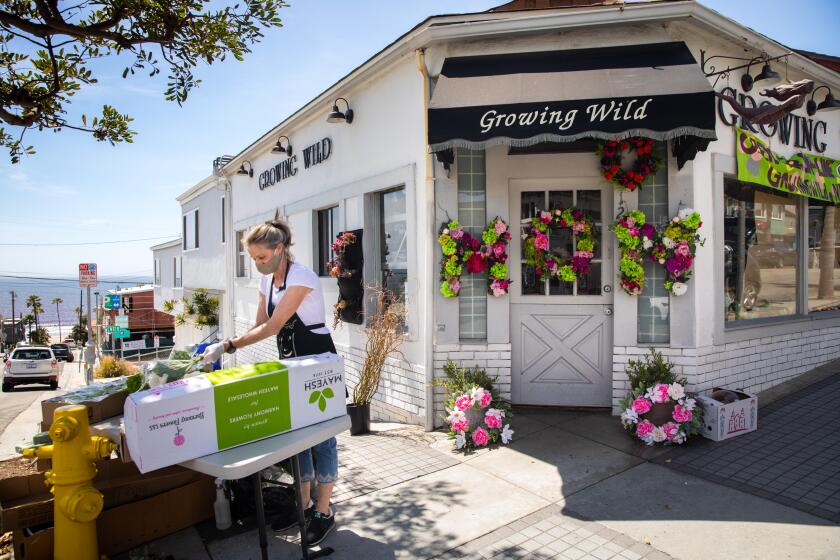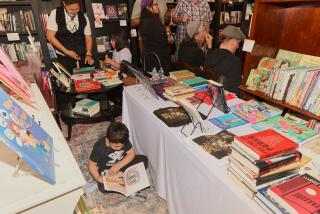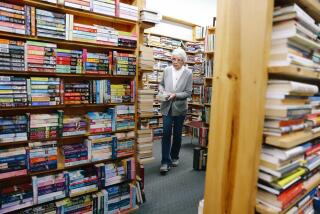For booksellers in L.A., a partial reopening brings hope and anxiety
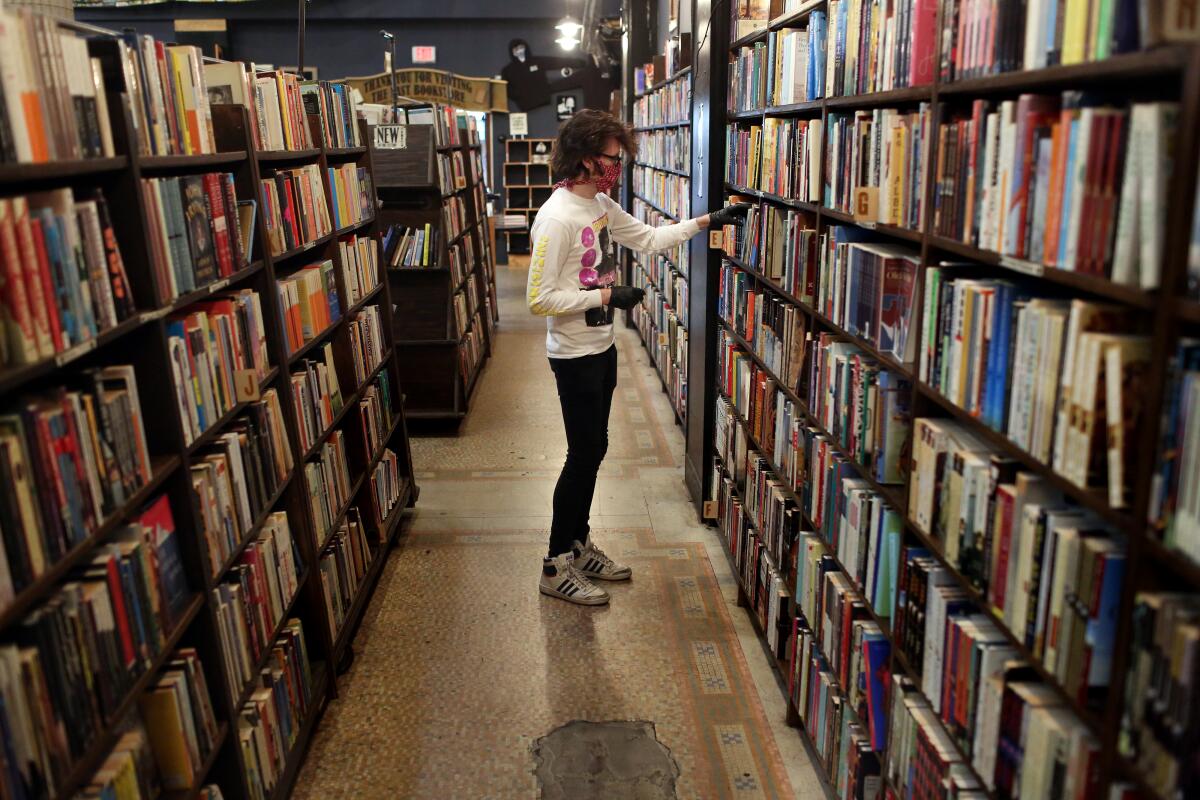
On a recent Saturday afternoon, Hillary McMahon pulled up into a parking spot in Pasadena, where a sign attached to a traffic cone read: “Reserved for Vroman’s Curbside Pickup. Space 1.” She dialed the phone number listed below the sign and let the store know she was ready for her book.
McMahon, 72, of La Cañada Flintridge, got out of her car, opened the trunk, hopped back inside and put on her blue mask. Minutes later, an employee wearing sunglasses, blue gloves and a mask walked out of the empty bookstore on an eerily quiet Colorado Boulevard, brown paper bag in hand, and dropped into the trunk a copy of Claudio Saunt’s “Unworthy Republic.”
For the record:
2:32 p.m. May 22, 2020John Evans, co-owner of Brentwood’s Diesel, A Bookstore, was incorrectly quoted as lamenting the lack of PPE for his store. He was referring to PPP, the Payroll Protection Program.
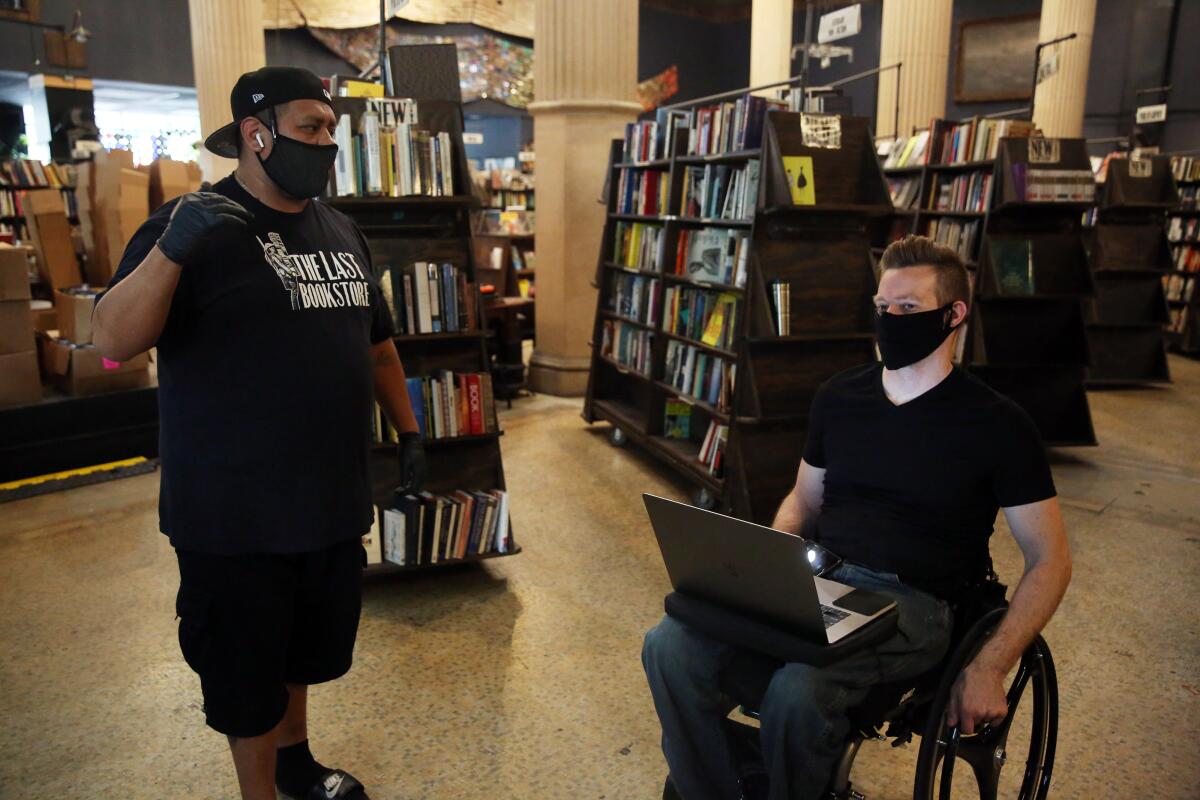
Vroman’s, with locations in Hastings Ranch and Pasadena, is among L.A.’s many independent bookstores — including Stories, Pages and Chevalier’s — that have started offering contactless, curbside service since Gov. Gavin Newsom allowed some retailers to reopen May 8 within strict guidelines for limiting the spread of the coronavirus. It’s become one of several ways struggling indie booksellers are working to stay afloat since nonessential businesses were forced to shutter in March.
Curbside pickup is helping stores handle what demand there is while opening up a path to normalcy, but sales have not yet begun to rebound from their drop of roughly 50 to 70% during the pandemic, according to several local booksellers. And the partial reopening brings with it new concerns over how to balance the safety and satisfaction of both customers and employees — not all of whom feel it’s safe to return.
On May 14, the California Independent Booksellers Alliance held a virtual town hall for booksellers featuring a special guest — a nurse.
In advance of the meeting, nurse Jean Taylor-Woodbury distributed information on the government’s COVID-19 guidelines: site-specific protection plans; disinfecting protocols; training and screenings of employees and a detailed risk assessment.
Over the course of the call, which went well over an hour, 72 booksellers from across the state asked Taylor-Woodbury a variety of critical questions: How long does the virus stay on paper and cardboard? How do you disinfect money? Do we have to disinfect books after browsers touch them? (The answer was “yes”.) How do you disinfect books? What do we do if customers won’t wear masks? Is there a better way to access testing? How long will someone test positive?
California allows some retailers to open with curbside service, including bookstores, florists and toy stores. Many parks will reopen Saturday.
Employers were also given advice on best practices: If it’s a local sale, opt for delivery. Conduct transactions at the door instead of inside. Consider retaining pickup service even if things begin going back to normal. Assign employees specific tasks. Don’t work 12-hour days. Take it one day at a time. Breathe.
CALIBA’s town-hall meetings have been held weekly since the shutdown, according to the group’s executive director, Calvin Crosby. “As things have surfaced that are crucial for the bookstores, we’ve been able to find an expert” to lead the conversations, he said. “With [the] Phase 2 opening, we decided it was time for a medical expert because there’s still a lot of fear.”
Crosby believes the meeting helped calm wary booksellers. “I think it helped everybody breathe a little better.”
But for James Fugate, co-owner of Leimert Park’s Eso Won Books, maintaining calm during a pandemic is a challenge. On a recent Tuesday afternoon, in between answering phone calls and handing customers books curbside, he said his anxiety was off the charts.
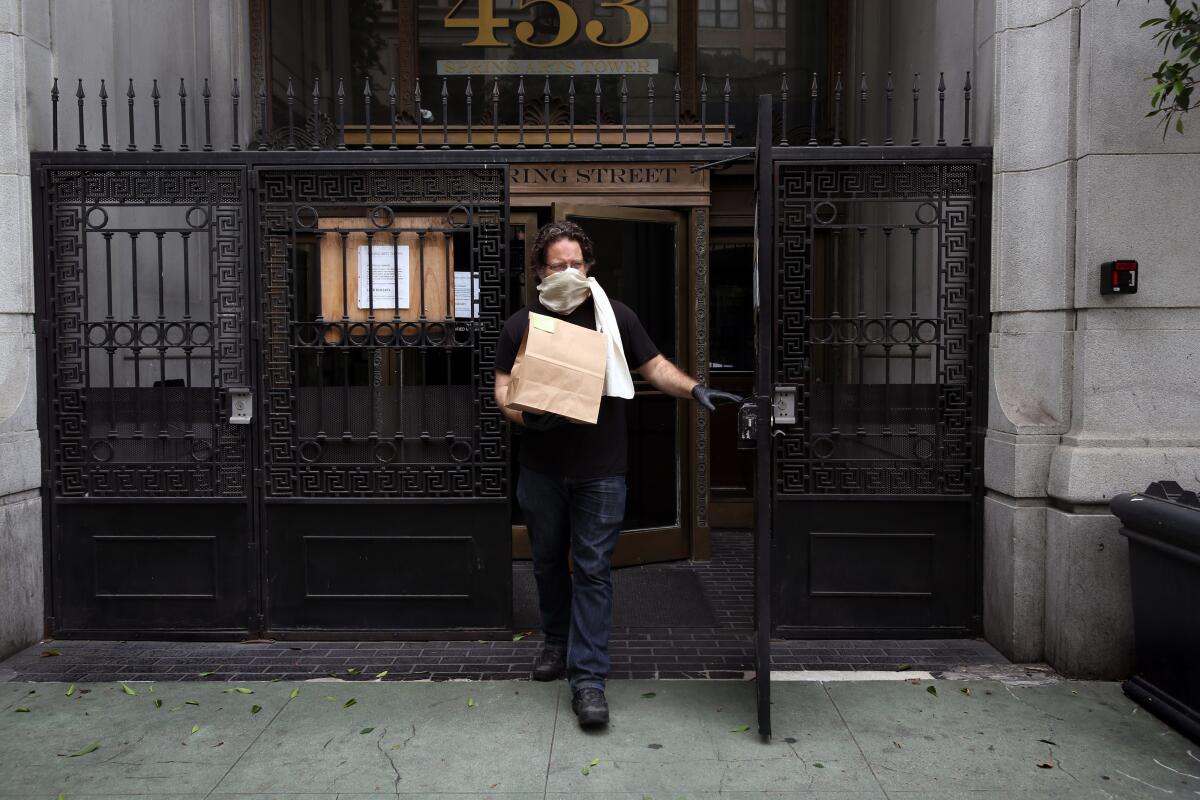
“I’m handling the partial reopening OK but in another way I’m not,” said Fugate, whose 40-year-old bookstore specializes in titles by African American writers. “It’s really strange.”
He’s happy to see and interact with customers again, but passersby without masks concern him, and he understands the inherent risks of being open. Still, sales have plummeted 70% since March, so he’s glad to offer curbside service in addition to mail orders. “We must have 20 orders for pickup right now,” he said excitedly over the phone.
But it’s a lot of work between two people, he said; he’s considering bringing on a third person to help.
“The economy is tough right now,” he said. “So many people are out of business, but I think we’re going to hold on ... We’re just trying to hold on as much as we can.”
Curbside service is business as usual for Brentwood’s Diesel, A Bookstore, which has been offering it since mid-March. But with the partial reopening, the indie bookstore has seen a surge in pickups.
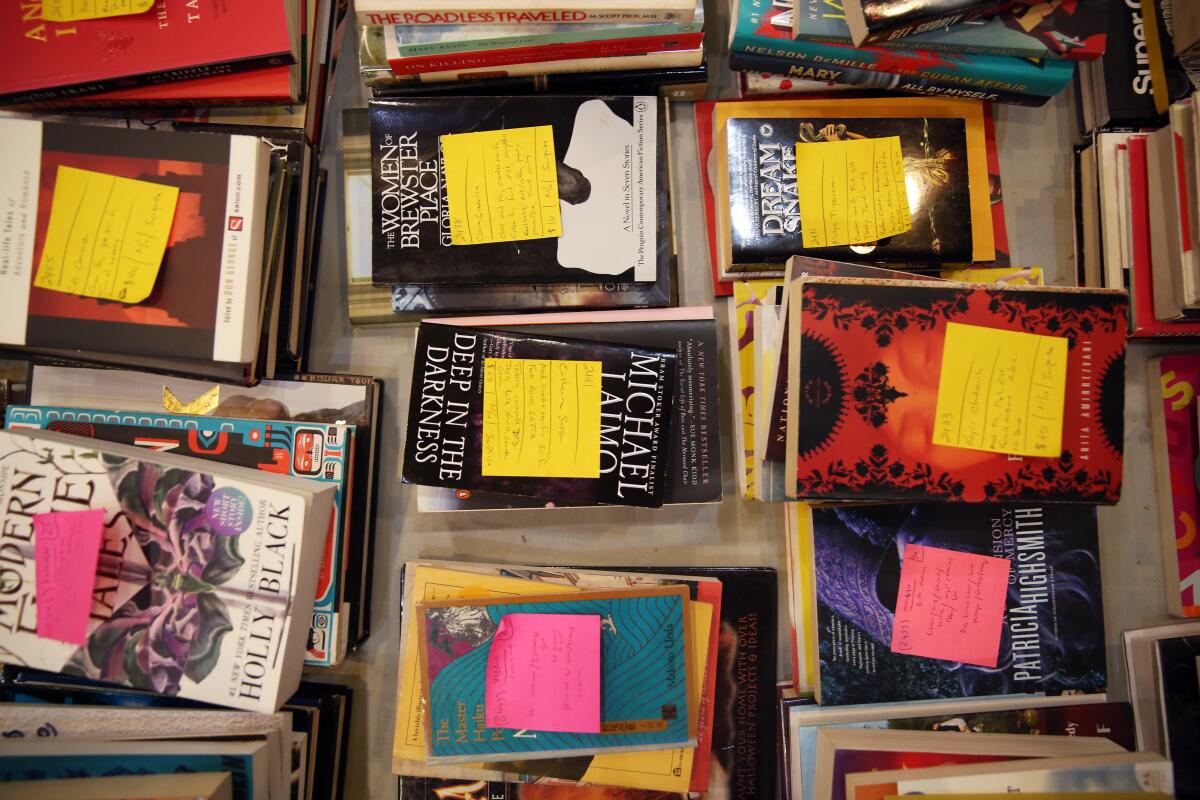
“We have three times as many curbside orders since May 8, and we’ve definitely seen a reduction in shipping,” said co-owner John Evans in a phone interview Tuesday. “We had 120 orders for pickup that came last night,” he added, saying it was one of the most intense periods since the holiday season.
Keeping a bookstore open is much more laborious and time consuming during a pandemic, he said. Even with assistance from two or three other employees, Evans has been working 10 to 12 hours a day — taking phone calls, shipping ordersand recommending books by phone to quarantined customers.
But it’s not enough. Sales have dropped 70 to 80%. “It’s brutal and we haven’t gotten any [Payroll Protection Program] money,” he said. “If we don’t get PPP, how will we survive the next period?”
At the Last Bookstore downtown, co-owner Josh Spencer said offering curbside pickup has “somewhat” helped. “We have had a pretty active mail order and delivery business since we shut down, so being able to add curbside definitely took off some of the time to pack a lot of the packages and allowed us to process the curated bundles quicker for customers. They definitely appreciate that.”
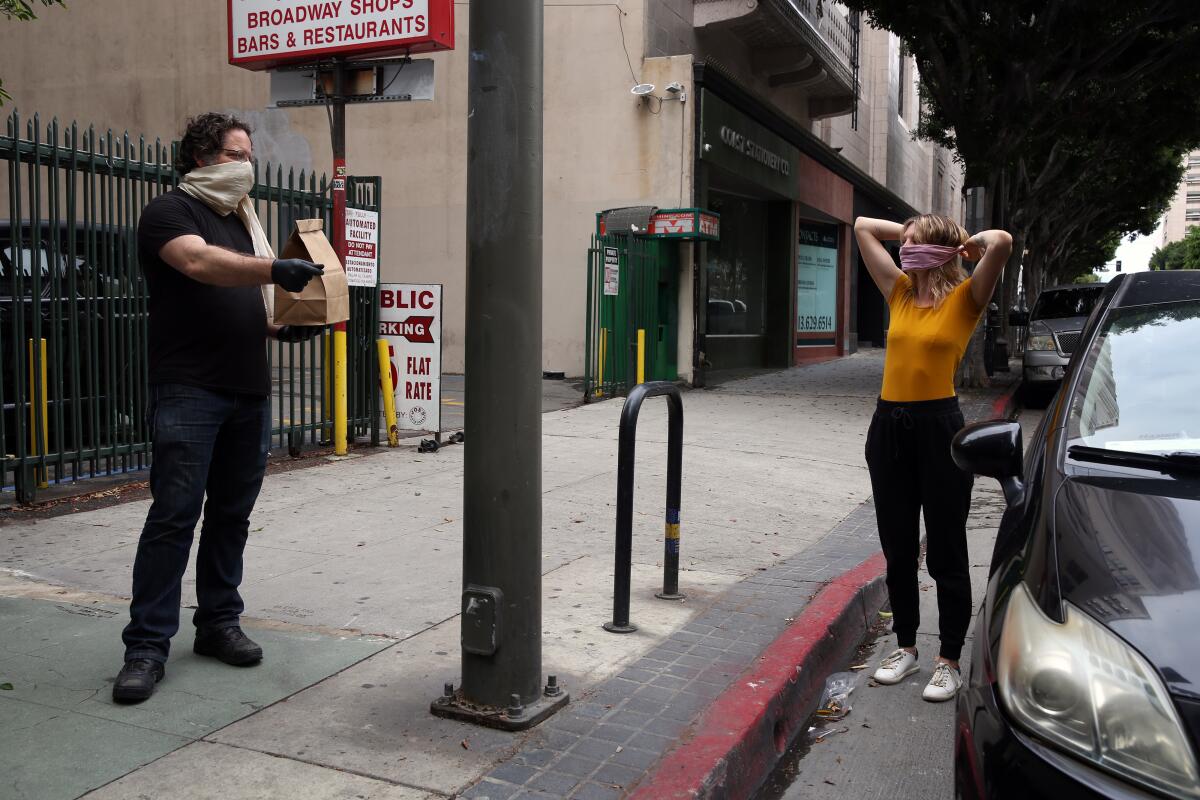
Yet the new pickup option hasn’t increased sales for the beloved indie; “It’s just made it a little bit easier for us to process the orders that we are getting.”
Spencer is eager to open back up for browsing — with safety measures in place.
“We definitely need to reopen at some point this summer,” he said. “We need the business. If we’re going to survive this, we need to sell more books.”
Even with the state safety guidelines, some bookstore workers still don’t feel safe going back to work. Joseph Ocón, a bookseller at Vroman’s Pasadena, relaunched the CA Bookstore Workers Relief Fund, a GoFundMe for Vroman’s and Book Soup employees who choose to call out of work and forgo income for their own safety.
“We feel uncomfortable being asked to return to work,” reads a May 12 update from Ocón. “Our employer assures us that we will be safe, but we know what is being asked of us: to sacrifice our health and the health of our loved ones for the sake of the store.”
So what can employers do to make Ocón and his colleagues feel safe? “One thing that would be important for me personally is just a recognition that there are things that can be done, but ultimately it is still going to be a risk,” he said during a phone interview.
Crosby of CALIBA says that for booksellers, safety “is at the forefront of everyone’s mind.”
“It’s an amazing community,” Crosby added. “The independent bookseller’s ability to reinvent themselves has been tested every five, six, seven years. If we look at the last 20 or 30 years, [indies] survived the big-box chains shutting down our stores. We survived the financial bust in 2008, 2009. We’ve survived Amazon strip lining the book industry.
Yes, there will be casualties, Calvin concluded, but “We’re going to survive this.”
More to Read
Sign up for our Book Club newsletter
Get the latest news, events and more from the Los Angeles Times Book Club, and help us get L.A. reading and talking.
You may occasionally receive promotional content from the Los Angeles Times.
